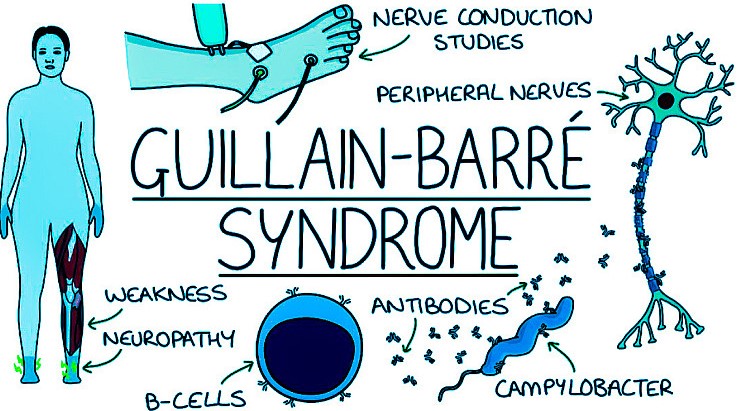Rising Cases of Guillain-Barré Syndrome in Pune- What You Should Know
Rising Cases of Guillain-Barré Syndrome in Pune- What You Should Know
Pune has witnessed a significant rise in cases of Guillain-Barré Syndrome (GBS), with 67 confirmed cases so far, as per the state’s health department. This surge includes eight new suspected cases reported recently. The city’s health authorities, including a Rapid Response Team (RRT), are actively investigating the situation. According to Dr. Vaishali Jadhav, assistant health officer at Pune Municipal Corporation, among the 67 cases, 43 are men and 24 are women, with 13 patients currently requiring ventilator support due to severe respiratory involvement.
Guillain-Barré Syndrome is a rare and serious neurological disorder in which the body’s immune system mistakenly attacks the peripheral nerves, leading to muscle weakness and numbness. In some cases, this condition can progress to paralysis, making it a potentially life-threatening condition.
Recognizing the Symptoms of Guillain-Barré Syndrome
The onset of Guillain-Barré Syndrome is usually marked by weakness and tingling sensations, particularly starting in the legs and feet. These symptoms often spread upwards, affecting the arms and upper body. Other common signs to watch for include:
Difficulty walking steadily or climbing stairs
Double vision or blurred vision
Rapid heart rate
Severe muscle cramping
Numbness or “pins and needles” sensation in the hands, feet, and other extremities
Low blood pressure
The muscle weakness associated with Guillain-Barré Syndrome can rapidly progress, sometimes leading to paralysis if left untreated. The exact progression and severity of symptoms can vary from one individual to another.
Potential Causes of Guillain-Barré Syndrome
Although the exact cause of Guillain-Barré Syndrome remains unclear, there are several known triggers that could initiate the condition. Most notably, it often follows a respiratory or gastrointestinal infection, particularly those caused by viruses or bacteria. Other potential causes include recent vaccinations, surgeries, or pre-existing neuropathy, all of which may act as triggers for the immune system to start attacking the nerves.
It’s important to note that GBS is not contagious. It cannot be spread from person to person, nor is it inherited. The syndrome can affect individuals of any age, although it tends to occur more frequently in people between the ages of 30 and 50.
Why the Surge in Pune?
The health department in Pune is focusing on understanding why the region has seen an uptick in GBS cases. To that end, health teams are conducting door-to-door surveys in affected areas, collecting water samples, and speaking with residents. Preliminary investigations have suggested that water contamination may be playing a role in the rise of GBS cases. The presence of certain pathogens or toxins in the water supply might be contributing to the increased incidence of the syndrome, though further studies are needed to confirm this.
Complications of Guillain-Barré Syndrome
Given that Guillain-Barré Syndrome impacts the nerves, it can lead to a variety of complications that can affect the body’s basic functions. These include:
Breathing difficulties due to paralysis of the respiratory muscles
Heart-related issues, including irregular heart rhythms
Blood clots, particularly in patients who are immobile
Impaired bowel or bladder control
Chronic pain or discomfort
In rare cases, some individuals may experience a relapse or a recurrence of symptoms after recovering from an initial episode of GBS.
Treatment for Guillain-Barré Syndrome
Guillain-Barré Syndrome is a medical emergency that requires immediate attention. There is no definitive cure for the condition, but early intervention can significantly improve outcomes. Treatment generally involves hospitalization and supportive care, particularly for patients who experience severe symptoms. Those who have difficulty breathing may require the use of a ventilator to assist with respiration.
Given that Guillain-Barré Syndrome is an autoimmune disorder, the acute phase of the illness is typically treated with immunotherapy. One of the primary treatment options is plasma exchange, which involves removing harmful antibodies from the patient’s blood and replacing them with donor plasma. Another treatment option is intravenous immunoglobulin (IVIg), which helps to reduce the immune system’s attack on the nerves.
The recovery process for Guillain-Barré Syndrome can be long and requires physical rehabilitation. Many patients experience some degree of recovery, though full recovery may take months or even years. However, a small percentage of people may have lasting effects from the disease, including weakness or nerve damage.
Guillain-Barré Syndrome (GBS)
The rise in Guillain-Barré Syndrome cases in Pune has raised concerns, especially with ongoing investigations into potential environmental causes. Though the condition is rare, it can be serious and life-threatening. Early diagnosis and prompt medical treatment are crucial for improving recovery outcomes. If you or someone you know begins to exhibit the symptoms of Guillain-Barré Syndrome, seeking immediate medical attention is essential to reduce the risk of complications.
Also Read –
